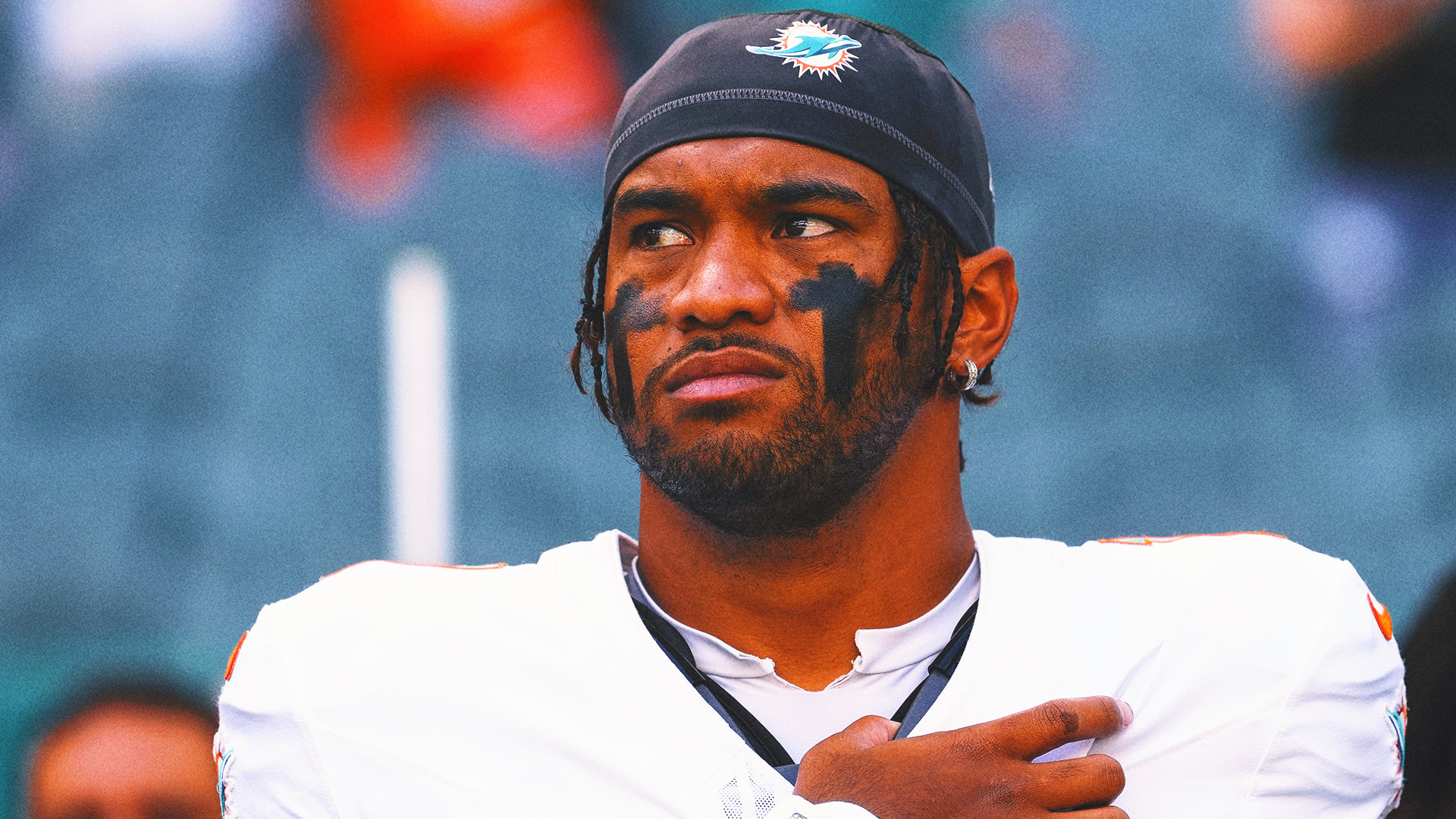
Former Players React to Tua Tagovailoa's Comments: 'They Don't Respect Tua'
Entities mentioned:
- Tua Tagovailoa: Leadership, Recognition, Frustration
- Miami Dolphins: Competitive spirit, Unity, Professional pride
- Former NFL Players: Indignation, Professional pride, Criticism
Article Assessment:
Credibility Score: 75/100
Bias Rating: 50/100 (Center)
Sentiment Score: 25/100
Authoritarianism Risk: 20/100 (Strongly Democratic)
Bias Analysis:
The article presents multiple perspectives, including Tagovailoa's initial comments and reactions from various former players. While critical of Tagovailoa, it balances this with context and doesn't lean heavily to either political side.
Key metric: NFL Team Cohesion and Leadership
Let me tell you something - this story is a FUMBLE of EPIC proportions! Tua Tagovailoa just threw an interception in his own end zone, folks! His decision to air the team's dirty laundry is like calling a trick play on 4th and inches - it's RIDICULOUS and shows a lack of locker room leadership. The Dolphins' quarterback is getting sacked by his own teammates here, and former players are piling on like it's an all-out blitz! This is a CRUCIAL moment for team chemistry, and Tua's leadership is under review. He needs to huddle up, regroup, and find a way to win back his squad's respect or he might find himself riding the bench. I'm telling you right now, this kind of move can lose you the game before you even hit the field!

GOP governors are sending troops to DC. Their states have 10 cities with higher crime rates
Entities mentioned:
- Republican Governors: Loyalty, Political ambition, Influence
- President Donald Trump: Power, Control, Legacy
- DC Mayor Muriel Bowser: Duty, Security, Professional pride
- Democratic lawmakers and activists: Moral outrage, Justice, Righteousness
- Sen. Thom Tillis: Criticism, Duty, Wariness
Article Assessment:
Credibility Score: 75/100
Bias Rating: 40/100 (Lean Left)
Sentiment Score: 35/100
Authoritarianism Risk: 55/100 (Mixed/Neutral)
Bias Analysis:
The article leans slightly left, evidenced by its critical stance towards Republican governors and Trump's actions. It provides contrasting viewpoints but gives more space to critics of the troop deployments.
Key metric: Violent Crime Rate
As a social scientist, I analyze that this article highlights the complex interplay between federal and state politics, crime statistics, and resource allocation. The deployment of National Guard troops to Washington, DC by Republican governors, despite their own states having cities with higher crime rates, suggests political motivations rather than a genuine focus on addressing crime. This action may be seen as an attempt to support President Trump's agenda and gain political favor, rather than addressing local crime issues. The article raises questions about the effectiveness of such deployments in reducing crime and the potential negative impacts on the communities these troops are leaving behind. It also underscores the importance of data-driven policy-making and the need for a more nuanced approach to addressing crime that goes beyond simply increasing law enforcement presence.

White House lands on Trump-Putin summit location as officials race to prepare for historic Alaska meeting
Entities mentioned:
- President Donald Trump: Ambition, Power, Legacy
- Vladimir Putin: Power, Influence, Control
- White House officials: Duty, Professional pride, Security
- Secretary of State Marco Rubio: Duty, Influence, Professional pride
- John Bolton: Wariness, Criticism, Influence
- President Joe Biden: Duty, Security, Influence
- Steve Witkoff: Loyalty, Influence, Duty
- Volodymyr Zelensky: Security, Influence, Self-preservation
Article Assessment:
Credibility Score: 70/100
Bias Rating: 55/100 (Center)
Sentiment Score: 45/100
Authoritarianism Risk: 35/100 (Generally Democratic)
Bias Analysis:
The article presents multiple perspectives, including critics of the summit. However, it leans slightly towards emphasizing concerns and potential risks, while still maintaining a relatively balanced approach.
Key metric: International Relations and Diplomacy
As a social scientist, I analyze that this summit between Trump and Putin represents a significant shift in US-Russia relations, potentially impacting global geopolitics. The rushed nature of the preparations and the choice of location in Alaska suggest an unconventional approach to diplomacy. The one-on-one format raises concerns about transparency and accountability. The exclusion of Ukraine's President Zelensky from direct participation could affect the balance of power discussions regarding the ongoing conflict. This meeting may influence international perceptions of US foreign policy and its stance towards Russia, potentially altering alliances and diplomatic strategies globally.

DC Mayor Bowser changes her tone on Trump as crackdown ramps up
Entities mentioned:
- Mayor Muriel Bowser: Self-preservation, Duty, Control
- Donald Trump: Power, Control, Influence
- DC Council: Duty, Self-preservation, Unity
- House Minority Leader Hakeem Jeffries: Moral outrage, Opposition, Justice
- Mayor Karen Bass: Criticism, Justice, Duty
- Christina Henderson: Empathy, Duty, Unity
- Free DC project: Justice, Freedom, Moral outrage
Article Assessment:
Credibility Score: 75/100
Bias Rating: 45/100 (Center)
Sentiment Score: 35/100
Authoritarianism Risk: 55/100 (Mixed/Neutral)
Bias Analysis:
The article presents multiple perspectives, including those of Mayor Bowser, other Democrats, and local activists. While it leans slightly critical of Trump's actions, it also highlights Bowser's pragmatic approach, maintaining a relatively balanced view.
Key metric: Political Polarization
As a social scientist, I analyze that this article highlights the complex dynamics between local and federal governance in Washington, DC, particularly in the context of law enforcement. The tension between Mayor Bowser's measured responses and the more outspoken criticism from other Democrats and activist groups illustrates the delicate balance required in navigating federal intervention in local affairs. This situation exacerbates political polarization by pitting local autonomy against federal authority, potentially deepening divides between different levels of government and political ideologies. The article also underscores the unique challenges faced by DC due to its lack of statehood, which limits its ability to resist federal overreach and may further fuel debates about DC's status and representation.